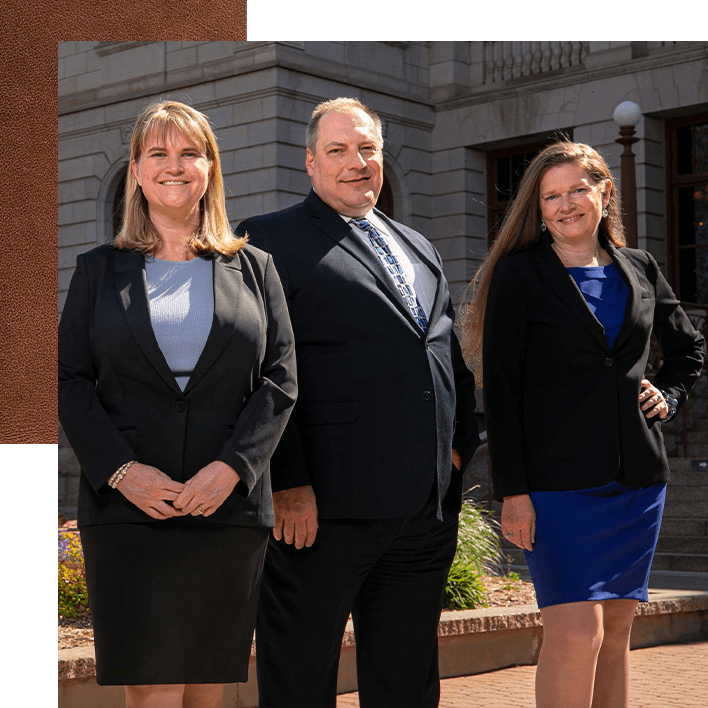

Colorado Springs Divorce Lawyers
How Our Colorado Springs Domestic Relations Attorneys Can Help You
When considering divorce in Colorado, or if divorce papers have been served, seeking legal representation and counsel from a divorce attorney can be highly beneficial. For over 20 years, the Gasper Law Group in Colorado Springs has successfully handled countless divorce cases. Our divorce attorneys take a personalized approach to help you achieve the desired outcome for your family. Our divorce lawyers in Colorado Springs can help you navigate divorce and create a favorable solution.
We understand that it might be a challenging time for you and your family — many divorce cases can be complex and difficult to navigate on your own. That’s why our compassionate lawyers are here for you. We work to ensure the best possible outcome for your family. No matter your situation, we can provide invaluable legal assistance and representation throughout the entire divorce process. One of our highest priorities is communication, and our supporting legal staff at The Gasper Law Group focuses on providing regular case updates and ongoing communication.
To schedule a FREE initial consultation to discuss your case with our skilled Colorado Springs divorcelawyers, call us at (719) 212-2448 or complete our contact form.

(719) 212-2448 or complete our contact form.
Understanding the Types of Divorce in Colorado
Before filing for divorce, it’s important to understand how family court proceeds with a dissolution of marriage in family court. Legal proceedings for divorce are handled by the court, and therefore may vary at a state level. To make things easier for our clients, we’ve put together a dissolution of marriage roadmap so you can learn how divorce in Colorado typically progresses and what to expect during each stage.
Our Colorado divorce lawyers have a wealth of experience and knowledge to provide about the following types of divorce and considerations:
-
No Fault DivorceThe only proof needed for divorce under Colorado law is that the marriage is “irretrievably broken.” No-fault divorce means that fault is not considered a factor in divorce.
-
Contested & Non-Contested DivorceDissolving a marriage is divided into two key considerations, which is contested vs. uncontested divorce. If a divorce occurs with both parties agreeing on all points (child custody, child support, division of assets, and spousal maintenance) then the divorce is considered an uncontested divorce. However, if any of these or other circumstances related to the marriage are in dispute, it becomes a contested divorce.
-
High Asset DivorceWhen businesses, property, and other valuable assets are involved in a divorce, complications may arise that require help from a high asset divorce attorney.
-
Military DivorceMilitary divorce in Colorado has some special considerations that civilian divorce might not, such as circumstances relating to duty stations and what to do about healthcare benefits.
-
AnnulmentsYou may have many reasons to seek an annulment of a marriage rather than a divorce, but there are certain criteria that must align in order to qualify.


-
"My charges were dropped and we walked away with all parental rights/custody and a restraining order against the other party."Caryn Adams and her team are hands down the BEST. I don't think I would have made it through what I went through without her by my side. My charges were dropped and we walked away with all parental rights/custody and a restraining order against the other party.- Avarie J.
-
"If you need legal help use Gasper, ask for Christine I am thankful I did!!!"I don't write many reviews! Gasper Law Group proved to be worthy of my highest recommendation. Everyone at some time will need some legal service, but where to go. I want you to know Gasper Law Group can help you save what you might stand to lose. I really want you to know Christine S. is the finest Family Law Attorney you will find. Christine is experienced, committed to her clients, and will help save what whats most important to you. I would so like the leadership of Gasper Law Group to know how fortunate they are to have a team member of her Caliber. If you need legal help use Gasper, and ask for Christine I am thankful I did!!!- Eric D.
-
"They took care of my case in a very timely manner and made it feel like my traffic ticket was their number one and only priority."Caryn Adams, Stacey Sadler and the rest of the team at the Gasper law group are an amazing, courteous, compassionate, and very helpful group of talented individuals. I was in a bind and during my consultation I explained my situation and they went above and beyond my expectations. They took care of my case in a very timely manner and made it feel like my traffic ticket was their number one and only priority. I have never been treated with such respect and compassion. I definitely recommend talking to them about any of your legal needs.- Scott R.
-
"Caryn Adams took such good care of me"Caryn Adams took such good care of me threw out my legal situation and was constantly keeping me in the loop! Couldn’t ask for better representation!- Ryan L.
-
"Don’t have much hope? Leave it to Caryn she will change that."I dug myself a deep hole and didn’t have much hope or luck with the attorney I used before. I called Gasper law group and Caryn Adams was my attorney that took charge of everything. I couldn’t have asked for anything better the outcome she made possible is everything I wanted. She is great at her job and takes cases seriously … don’t have much hope leave it to Caryn she will change that. Thanks Gasper law group you’re the best!- Mike L.
-
"I was absolutely floored with the knowledge and expertise that not only Caryn carries, but the firm as a whole."I, unfortunately, was involved with two separate situations within a few years of each other, which left me in quite a bind both times. I was lucky enough to have Caryn assist me in both cases and was absolutely floored with the knowledge and expertise that not only she carries, but the firm as a whole. One of the best, if not the best lawyers I've ever come across. Extremely nice and very honest. I was able to resolve my situations with minimal impact and continue my life without fear of being held back.- Former Client
-
"From the start, they treated me incredibly well and were very open about everything from my situation."The Gasper Law Group was fantastic. From the start, they treated me incredibly well and were very open about everything from my situation. They were incredibly attentive to me and my case and made sure I fully understood everything while supporting me in every way they could. Caryn was AMAZING in handling my case. Her knowledge, confidence, and attentiveness were second to none. I would recommend them to anyone for any situation.- Jason E.
-
"The professionalism, guidance, and candor I’ve received from each person in this law firm has been beyond reproach."
I’m not one to have an extensive experience with law firms or lawyers and court in general. However, the professionalism, guidance, and candor I’ve received from each person in this law firm have been beyond reproach. Anytime, I mean, anytime, I’ve had a question about my case and the way forward, I was met with a friendly and constructive conversation about my case. There was never a doubt in my mind, that I made the right choice when I selected this law firm to represent me. Caryn and Stacie have been a wonderful blessing to my life and my legal proceedings. If you are looking for a no-BS law firm that has a significant reputation in the Springs area, I absolutely recommend this one. Even though I hope to not have to deal with this again, fingers crossed and every lucky charm, I’d trust this law firm with my representation to handle the hard stuff and give me ease with court proceedings. Thank you all for what you do and have done for me, my family, and my career. Bless you all.
- Steve S.

Other Considerations When Getting Divorced
Our divorce lawyers in Colorado Springs work to address all legal considerations, including:
-
Child Custody And Child SupportOur child custody lawyers work to ensure the best for the children and all parties. When parents are getting divorced, one of the parents is expected to contribute financially to the well-being of the child(ren) through child support payments until they turn 19 years old. We can help you navigate all factors involved when getting divorced with children.
-
Legal SeparationSometimes couples choose legal separation rather than divorce if they no longer wish to legally reside together and desire to separate their debts but are continuing either therapy or an attempt to reconcile. The procedures followed for legal separation are the same as for divorce, the only difference is that after the decree is entered declaring the parties legally separated, the parties cannot be officially divorced until after six months following the decree of legal separation.
-
Property DivisionColorado is an equitable distribution state, meaning the property is divided in a way that is fair rather than “equal.” A number of factors come into play to make that determination and our divorce lawyers can help protect your interests.
-
AlimonyAlimony, referred to as spousal maintenance under Colorado law, allows one ex-spouse to provide financial support to the other either until they are either able to support themselves through employment or they remarry. Many factors can be at play when determining if alimony will be awarded, and no two cases are completely the same.
-
Restraining Orders
Many types of restraining orders may be filed in relation to divorce proceedings. It is important to know the difference and speak to our knowledgeable Colorado Springs divorce attorneys if you have questions.





Contact Our Colorado Springs Divorces Lawyers
The Gasper Law Group is dedicated to providing Colorado couples and families with quality legal representation during a divorce. With our vast knowledge and resources, our experienced attorneys can help protect your parental rights and financial assets and achieve the best possible outcome in all divorce and family law matters. Our law firm is conveniently located at 101 N Cascade Ave, Colorado Springs, CO.
Call us at (719) 212-2448 or schedule a free initial consultation to meet with one of our divorce lawyers in Colorado Springs.

Why Choose The Gasper Law Group?
-
Offering Payment Plans
-
Helping People First
-
Committed to the Community